

- #1. generally accepted auditing standards new principles verification
- #1. generally accepted auditing standards new principles professional
It is to ensure that financial information is represented fairly and accurately.Īlso, audits are performed to ensure that financial statements are prepared in accordance with the relevant accounting standards.
#1. generally accepted auditing standards new principles verification
Importance of AuditingĪudit is an important term used in accounting that describes the examination and verification of a company’s financial records.
In all cases where an auditor’s name is associated with financial statements, the report should contain a clear-cut indication of the character of the auditor’s work, if any, and the degree of responsibility the auditor is taking.Auditing typically refers to financial statement audits or an objective examination and evaluation of a company’s financial statements – usually performed by an external third party.Īudits can be performed by internal parties and a government entity, such as the Internal Revenue Service (IRS). When an overall opinion cannot be expressed, the reasons, therefore, should be stated.

(j) Expression of opinion: The report shall contain either an expression of opinion regarding the financial statements, taken as a whole, or an assertion to the effect that an opinion cannot be expressed. (i) Adequacy of informative disclosures: Informative disclosures in the financial statements are to be regarded as reasonably adequate unless otherwise stated in the report. (h) Consistency in the application of GAAP: The report shall identify those circumstances in which such principles have not been consistently observed in the current period in relation, to the preceding period. (g) In accordance with GAAP: The report shall state whether the financial statements are presented in accordance with generally accepted accounting principles (GAAP). (f) Obtaining sufficient competent evidential matter: Sufficient appropriate evidential matter is to be obtained through inspection, observation, inquiries, and confirmations to afford a reasonable basis for an opinion regarding the financial statements under audit. (e) Understanding of internal control: A sufficient understanding of internal control is to be obtained to plan the audit and to determine the nature, timing, and extent of tests to be performed. (d) Adequately planning and proper supervision: The work is to be adequately planned and assistants, if any, are to be properly supervised.
#1. generally accepted auditing standards new principles professional
(c) Due professional care: Due professional care is to be exercised in the performance of the audit and the preparation of the report. (b) Independence in mental attitude: In all matters relating to the assignment, independence in mental attitude is to be maintained by the auditor or auditors. (a) Adequate technical training and proficiency: The audit is to be performed by a person or persons having adequate technical training and proficiency as an auditor. The general, fieldwork and reporting standards (the 10 standards) approved and adopted by the membership of the AICPA, as amended by the AICPA Auditing Standards Board (ASB), are as follows: In the United States, the standards are promulgated by the Auditing Standards Board, a division of the American Institute of Certified Public Accountants (AICPA). Several organizations have developed such sets of principles, which vary by territory. Generally Accepted Auditing Standards or GAAS are sets of standards against which the quality of audits are performed and may be judged. Generally Accepted Auditing Standards (GAAS)


 0 kommentar(er)
0 kommentar(er)
